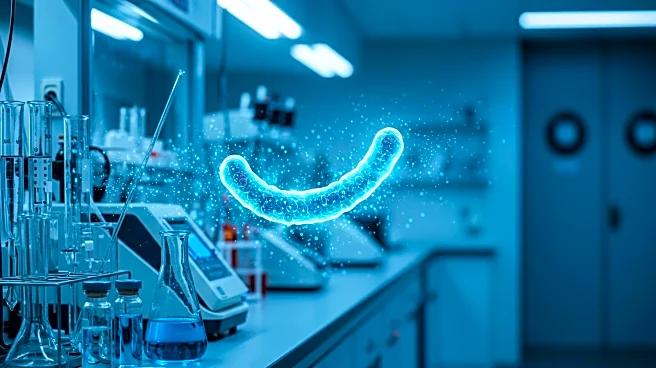What's Happening?
A research team led by Tobias Warnecke, PhD, from the University of Oxford and the MRC Laboratory of Medical Sciences, U.K., has discovered that archaea, a domain of life distinct from bacteria and eukaryotes, may produce enzymes capable of killing bacteria. The study, published in PLOS Biology, focused on peptidoglycan hydrolases, enzymes that cleave bacterial cell walls, found in archaea. The researchers conducted growth experiments with archaea and various bacterial species, demonstrating that these enzymes can effectively kill bacteria. This discovery suggests that archaea could be a significant, untapped reservoir for developing new antibacterial agents, especially as antibiotic resistance continues to rise.
Why It's Important?
The identification of archaea as a potential source of novel antibacterials is significant in the context of increasing antibiotic resistance. As traditional antibiotics become less effective, finding alternative methods to combat bacterial infections is crucial. This research highlights the potential of archaea to contribute to the development of new antibacterial treatments, which could have profound implications for public health and the pharmaceutical industry. By expanding the understanding of microbial interactions, this study opens new avenues for research and development in antimicrobial therapies, potentially benefiting patients and healthcare systems worldwide.
What's Next?
Further studies are necessary to fully understand the dynamics between archaea and bacteria and to explore the functionality of isolated peptidoglycan hydrolase domains with additional bacterial species. Researchers aim to investigate other identified domains and their interactions with bacteria to broaden the application of these findings. The ongoing research will focus on identifying specific target bacteria and refining the use of archaea-derived enzymes in antibacterial treatments. This could lead to the development of new drugs and therapies, addressing the growing challenge of antibiotic resistance.
Beyond the Headlines
The discovery of archaea's potential in producing antibacterial agents also raises questions about the ethical and environmental implications of harnessing these organisms for pharmaceutical purposes. Understanding the ecological roles of archaea in microbial communities and their interactions with bacteria could lead to a deeper appreciation of biodiversity and its applications in medicine. Additionally, this research may influence future studies on microbial ecology and the development of sustainable practices in drug discovery.









